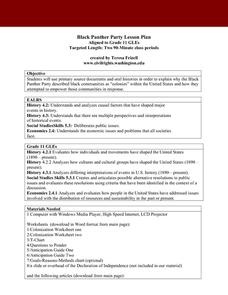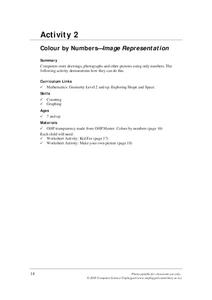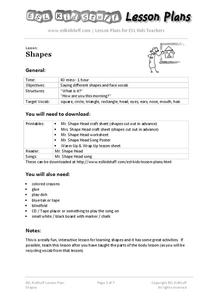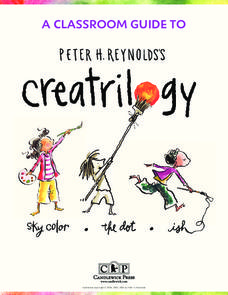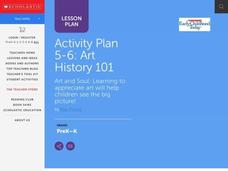Personal Genetics Education Project
Introduction to Personal Genetics
Adolescents have the opportunity to consider how they feel about the possibilities presented by the current availability of genetic sequencing. After some instruction, they participate in a four-corners activity in which you read a...
Santa Ana Unified School District
The Power of Point of View
Sometimes a whole story can change based on the perspective of the person telling it. Practice identifying and analyzing point of view in various reading passages and writing assignments with a language arts packet, complete with Common...
NPR
Lesson Plan: Trolls—Just Like You and Me?
Not all trolls hide under bridges; some of them hide behind computer screens! Learners explore the causes and effects of people leaving mean comments online. After learning vocabulary, watching and discussing a video, and responding to...
Curated OER
Black Panther Party Lesson Plan
Why did the Black Panther Party feel colonized, and what methods did they employ to achieve empowerment? Your class members will engage in an online PowerPoint presentation, analysis of several documents, and discussion in order to...
Florida Center for Reading Research
Phonological Awareness: Phoneme Isolating, Phoneme Quest
In this phonics activity, little learners glue picture cards under the initial, medial, and final phonemes represented by the lead sound cards. An image of a shark broken into three parts represents the initial phoneme /sh/, the medial...
Computer Science Unplugged
Colour by Numbers–Image Representation
How do computers store and send images? Here's an activity that explains one way a computer can compress image information. Pupils decode run-length coding to produce a black and white image. Pairs then work together to code and decode...
Advocates for Human Rights
The Rights of Women in the United States
Six diverse activities make up a substantial unit on the women's rights movement in the United States, past and present. A few of the topics at hand: the fourteenth and nineteenth amendments, the Equal Pay Act, the Lily Ledbetter Act,...
Health Smart Virginia
How the Namuhs Learned to be Content with Who They Are
The Namuhs have a lot to teach humans how idealized images presented in advertising can impact self-perception and self-worth. After brainstorming 10 traits the media sets as the perfect body, class members read a short story about the...
Media Smarts
Looking at Food Advertising
Tony The Tiger, The HoneyComb Kid, The Nestle Quick Bunny. As part of a study of the methods advertisers use to sell foods and how this advertising effects their food choices, kids create their own spokescharacter and/or jingle for one...
Institute of Electrical and Electronics Engineers
Shake it up with Seismographs!
Shake things up in your STEM or earth science classroom when you have small groups construct their own seismographs. A reading assignment on the history of seismographs, the Richter scale, and current technology sets the stage for the...
ESL Kid Stuff
Shapes
Work on shapes and body parts at the same time with a fun set of activities. Kids sing and read about Mr. Shape Head, who has shapes on his face, before making their own Mr. Shape Head.
Curated OER
Decision Making
"What pressures are there for teens to become sexually active?" The class writes anonymous responses on paper. The teacher then reads them aloud and the response is discussed by the group. They then examine their personal life goals and...
Curated OER
Finding Meaning in the Badge
Children who are three to five years old study two rank badges from the Qing dynasty to develop an understanding of social rank, language skills, and symbolism. The lesson is discussion-based and requires learners to compare and contrast...
Institute of Electrical and Electronics Engineers
Tennis Anyone?
After reading up on the history of sports racquets, engineering teams design and construct a racquet for batting a Velcro-striped ball at a target. Teams evaluate their design by aiming for the target three times each and answering...
Candlewick Press
A Classroom Guide to Peter H. Reynolds's Creatrilogy
Help young readers find, identify, and use their voices with a set of empowering activities based on Peter H. Reynolds' trilogy of books. Sky Color, Ish, and The Dot focus on recognizing moods and treating each other kindly, and their...
iCivics
Lesson 2: Misinformation
Fake news is a hot topic right now ... but what is it? Intrepid young investigators track down the facts that separate journalistic mistakes and misinformation through reading, research, and discussion. Part three in a five-instructional...
EngageNY
Interpreting, Integrating, and Sharing Information about DDT: Using Cascading Consequences and Fishbowl Protocol
What is your interpretation? Scholars look at their Cascading Consequences Charts and interpret the information they have gathered. Learners match claims with evidence and then watch a video. At the end, they carry out a fishbowl...
Center for History and New Media
Growing Up in a Segregated Society, 1880s–1930s
What did segregation look like in the beginning of the 20th century? Middle and high schoolers view images of segregated areas, read passages by Booker T. Washington and W.E.B. DuBois, and come to conclusions about how the influence of...
Nemours KidsHealth
Empathy: Grades 9-12
Empathy can be the glue that holds a society together. Learning how to see and appreciate a situation from another's point is key to developing empathy toward others. The two activities in this resource are designed to help teens...
Institute of Electrical and Electronics Engineers
Can You Canoe?
A neat handout immerses learners in the history of canoe making. After reading, small groups of mini engineers work to craft a canoe that will not be immersed! This is an ideal exercise in engineering design for your STEM curriculum or...
Teaching Tolerance
Understanding Online Searches
Discover what's behind an online search. Scholars read a handout and engage in discussions to learn how to critically evaluate online search results. Then, working in small groups, they create posters listing their demands for search...
Curated OER
Sequencing Stories
Students explore dramatization. In this literacy fluency and drama lesson, students listen to the story Mop Top by Don Freeman and add related sounds at the appropriate times. Students role play, pantomime, and add sounds to create a...
Curated OER
Activity Plan 5-6: Art History 101
Learners learn to appreciate art. In this early childhood lesson plan, students read about different artists and imitate their style to develop creative thinking, and language and literacy skills.
Curated OER
Create a Computer Story
Second graders will create their own story and read it aloud. In this literacy/technology lesson, 2nd graders use computer software to create their own story, which is read back to them while they write it. Afterward, the student should...





